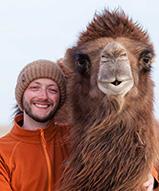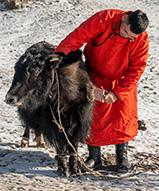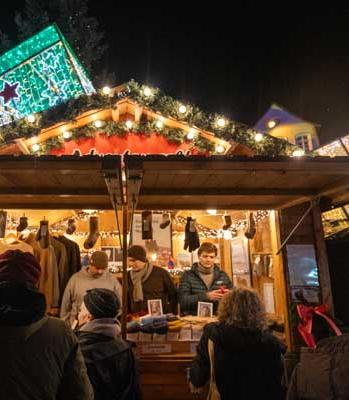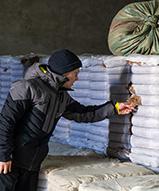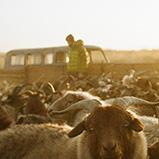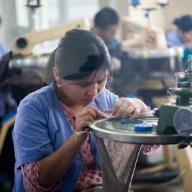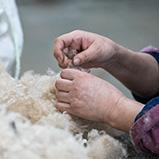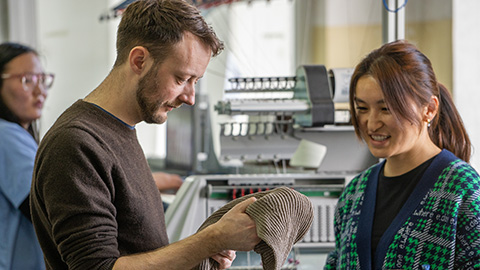Fair Trade
Fair Trade
People, animals and companies come together within a supply chain.
It is therefore important that the principles of cooperation are designed fairly and developed sustainably.

Opportunities for nomadic families
Nomads often live in difficult harsh conditions. They move through the steppes and deserts of Mongolia with their animals whilst being exposed to an extreme climate. At times there is not enough water or the temperatures reach record lows. For both humans and animals, it can quickly become too hot, too dry or too cold. This makes it difficult for nomads to provide their animals with sufficient care and food during times like harsh winters. The sale of animal wool offers them a secure source of income and allows sufficient food to be purchased in advance.
Our producers source their wool exclusively from Mongolian nomadic families and ensure a secure and adequate source of income for the nomadic population of Mongolia.
2. Transparenz und Rechenschaftspflicht
Auf allen Ebenen der Lieferkette ist die Kommunikation offen und die Geschäftsbeziehungen transparent. Otgondava, unsere Kleidungsproduzentin, teilt mit uns relevante Informationen über ihre Produktionskosten sowie die Einkaufspreise der Wolle.
Um zur Transparenz beizutragen legen wir hier unsere überschlagene Kostenstruktur offen, die einen Einblick in die Aufwendungen für den Wareneinkauf sowie für weitere Unternehmenskosten (z.B. Personalkosten, Versand, Miete etc.) gibt. Der Wert unserer Kleidung wird auch dadurch deutlich, dass ein Großteil der Wertschöpfung in die Mongolei und an die dortigen Unternehmen und Arbeiter:innen fließt.

Transparency and accountability
Communication is conducted openly at all levels of the supply chain through transparent business relationships. Otgondava, our clothing producer, shares relevant information about their production costs, emissions and the purchase prices of the wool with us.
To provide greater transparency, we disclose our cost structure here. Our clothing's value is clearly demonstrated by the fact that a large part of the added value goes to Mongolia and to the companies and workers there. Something the textile industry does not often do.
The chart shows our total company costs as a percentage for the past financial year.



Faire trade practices
Fair trade practices ensure that the social, economic and environmental well-being of nomads and producers of clothing is safeguarded and that profits are not maximised to their detriment. In the process, cultural identity and the traditional nomadic skills of are particularly protected and promoted.
One of the most important aspects is to keep the added value in the country of origin: for many years, we have relied on a family-run business in Ulaanbaatar and on nomadic households in the Gobi Desert for the production of steppenstrolch products, to ensure that Mongolia retains a considerable part of the value-added.
Gender equality is promoted: In clothing production, where 75% of employees are women - including the senior engineer and other management positions. Contracts guarantee that women receive equal pay for equal work.

Fair payment
All parties are in constant dialogue to ensure fair prices, which are based on a transparent calculations between us and our producers. This means that both the employees in production and the nomads receive a fair wage that also takes demand and market prices into account.
Who receives how much?
The prices of raw wool vary depending on how high the demand is and how much wool is available after the winter. A kilogramme of unprocessed yak wool is sold by nomads for the equivalent of around €8.00 to €10.50. For camel wool, a nomadic family receives between ~€4.70 and €8.30 per kilogramme.
In Mongolia's production facilities, simple jobs are paid the statutory minimum wage, while other employees, such as seamstresses, are paid significantly more. The wages of employees in Germany are always above the minimum wage and are graded according to position and responsibility. All employees have transparent insight into wages from entry level to management salary.

Good working conditions
We ensure that everyone works in a safe and healthy working environment. We have signed contracts with our producers to ensure labour standards and the exclusion of forced labour or exploitative child labour.
In Mongolia, everyone has the right to join trade unions and conduct collective bargaining. We also ensure this contractually with the producers.
Some nomads in Mongolia organize themselves into cooperatives. They cooperate on pastures, water points and sales. This enables them to demand good prices for high-quality wool from producers and middlemen on the market.


